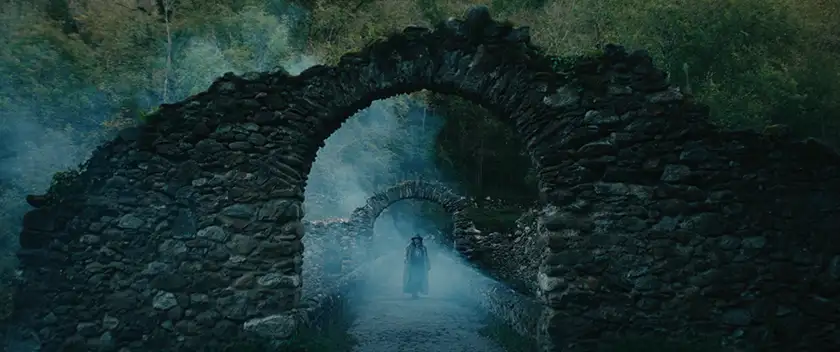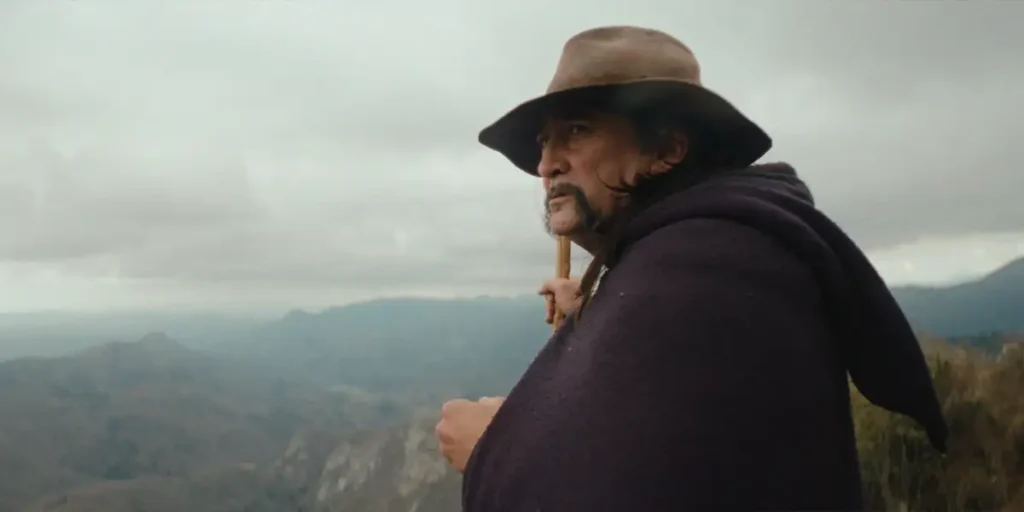Finnish documentary Shadowland, about controversial director Richard Stanley, is a fascinating example of a film evolving alongside its subject.
Director: Otso Tiainen
Genre: Documentary
Run Time: 98′
Night Visions Screening: November 15, 2024
Release Date: TBA
“We went to explore the zone, where they said the spirits walked and the waters healed. A place of wonder, we were told. A place of truth. What we discovered was a different story. A darker one…” So begins Shadowland, a Finnish production that has been touring the festival circuit and is set to make its domestic debut at Night Visions, one of the foremost genre events in the Nordics.
In 2015, the same festival played host to Richard Stanley, the main subject of the documentary and then still viewed as a major cult figure in the film industry. Now he’s a far more controversial name, and the filmmakers accurately chart the transformation, having shadowed Stanley during what turned out to be a transitional period for his reputation. The result is harrowing and riveting in equal measure.
Born in South Africa, Stanley first gained attention in genre circles with his horror films Hardware (1990) and Dust Devil (1992), which enabled him to get funding for his dream project: The Island of Dr. Moreau (1996), based on the H.G. Wells novel of the same name. However, complications on the set – including a well-publicized feud with actor Val Kilmer – led to Stanley being fired one week into filming, with John Frankenheimer coming in as his replacement. The finished product is generally regarded as a particularly bad movie, and the fraught production went on to become the topic of a documentary, Lost Soul: The Doomed Journey of Richard Stanley’s Island of Dr. Moreau.
Bruised by the experience, Stanley remained largely off the radar for two decades, and it’s at the tail end of that period that Shadowland begins chronicling his everyday life in France, where he developed an interest in the esoteric and magic history of Europe. Walking on hilltops with a staff that makes him look like Gandalf (although his musings are more Saruman-like), Stanley casts an intriguing shadow over the region, effectively forming a community with like-minded individuals. While they discuss the area’s past, present and future, the filmmaker also starts working on his comeback.
Said comeback arrived in 2020, in the shape of the H.P. Lovecraft adaptation Color Out of Space, a trippy sci-fi horror starring Nicolas Cage. Bolstered by the film’s success, Stanley announced he had two more Lovecraft projects in the works, with The Dunwich Horror set to be the second installment in the triptych. Then, in 2021, his former collaborator and partner Scarlett Amaris accused him of domestic abuse, at which point he became an industry pariah once again. As of Shadowland’s release, legal proceedings are still ongoing, with more allegations having emerged after Amaris first spoke out.

The documentary began as an exercise in cinephilia (producer and co-writer Kalle Kinnunen is one of the major film critics in Finland), charting the return to prominence of a director shunned by Hollywood. That initial focus on cinematic resurgence shifted as the abuse allegations became public, and the film itself marks the transition by situating it approximately at the halfway point, as the first broken voice of previously undisclosed suffering comes immediately after a brief section devoted to the triumphant reception of Color Out of Space.
It is not the first time such a thing has occurred (by its very nature, non-fiction cinema relies on adapting to external circumstances), but rarely has a filmmaker questioned their own work’s reason for existing as thoroughly as Otso Tiainen does here, with the second half turning into an introspective journey down an increasingly terrifying rabbit hole. Empathetically collecting testimony from people willing to share their stories (the end credits mention that six interviews were conducted, while other people declined to appear on camera, fearing retribution), Shadowland becomes a carefully painted portrait of the human side of an ultimately inhumane esoteric promise.
And yet, even though there is no explicit signposting beyond the opening title card, the camera manages to capture the less appealing side of Stanley earlier than expected: from the beginning, even as the crew is still ostensibly on his side, his aura is subtly off-putting, hinting at an uglier truth behind the shaman-like qualities on display. And so, when the other side of the story is brought to the fore in the film’s second half, the mask drops and the cult figure (in more ways than one) refers to his accusers as “witches”. That word brings about images of Donald Trump and his cronies referring to the former’s legal troubles as a “witch hunt”. Perhaps not the best verbiage when one wants to come across as unjustly smeared…
Shadowland will be screened at the Night Visions International Film Festival on November 15, 2024.

